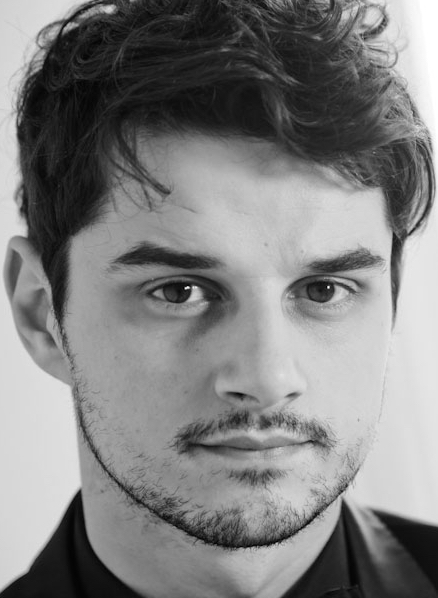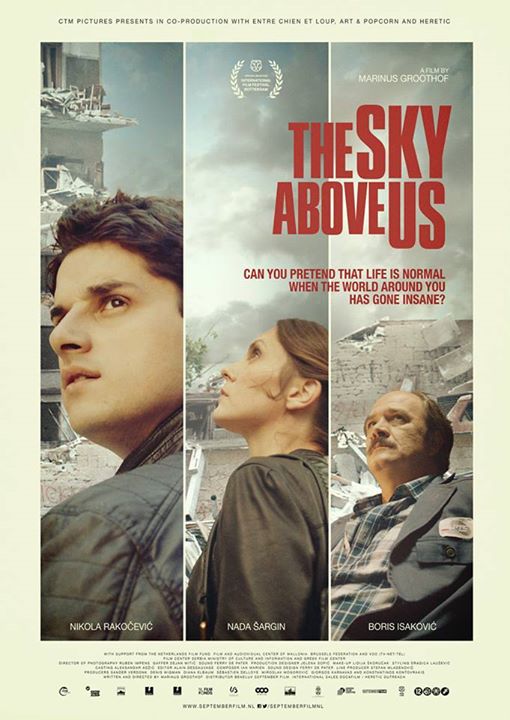Dutch director’s tale of NATO bombing of Belgrade informed by first-hand stories
 As a Dutch director telling an emotionally loaded story set during NATO’s bombing campaign of Belgrade, Marinus Groothof knew that deep research and first-hand accounts from people who lived through the bombings could make or break the film.
As a Dutch director telling an emotionally loaded story set during NATO’s bombing campaign of Belgrade, Marinus Groothof knew that deep research and first-hand accounts from people who lived through the bombings could make or break the film.
For his debut feature, Marinus has delivered The Sky Above Us, a subtle dramatisation of a key incident of NATO’s strategically targeted campaign that still rankles many Serbs: the bombing of national TV station RTS, which was seen as a key disseminator of Milošević propaganda.
“People think back on that time so differently but these stories are constructed from my viewpoint of how people were dealing with life under difficult circumstances,’ said Marinus.
“I think I have stayed very true to people and how they felt at that time.”
The result of all this effort is The Sky Above Us, the story of three people, Ana (Nada Šargin), Sloba (Boris Isakovic) and Bojan (Nikola Rakocevic), who work in or near the RTS building and how they adapt to outside pressures to go about normal life in abnormal times.
 “All the three character lines that I have are based on people that I know there,’ said Marinus. “Sometimes I used characteristics from another person or a little bit of a story from another person, but I know all these people in a way.”
“All the three character lines that I have are based on people that I know there,’ said Marinus. “Sometimes I used characteristics from another person or a little bit of a story from another person, but I know all these people in a way.”
Marinus knew that, to make his feature debut a success, he needed to speak with RTS staff and others who could make the various episodes come alive as a coherent story.
“It is a very delicate subject and, on top of that, being Dutch I wanted to be very truthful, so there was a lot of research on this film,’ Marinus said at his home in Amsterdam.
“I spoke to a lot of people who worked at RTS, guys who were literally out getting a hamburger when it was bombed. I also met with people from the theatre in Kalamegdan, and I already know characters like Bojan from my friends there, so that wasn’t so hard.
“There was a lot of reading and talking to come to the full story. But I didn’t speak to families of the victims because that would have been too emotional. I realised when making this film that I didn’t want emotion to cloud what I was doing or take me in a certain direction. I didn’t want to get too emotionally attached.”
Dutch director with strong ties to the Balkans
Marinus is already tied to the Balkans, though. The mother of his young son is Serbo-Croatian, while his current partner is from Belgrade. For the past decade, these connections have led to Marinus hearing many anecdotes about life in the 1990s.
It was one woman’s story that sparked him to write the award-winning short film Sunset from a Rooftop, which won the 2009 Golden Calf for best short, and was the Dutch entry in the short film category at that year’s Oscars.
“The seed for Sunset from a Rooftop came from a conversation with a friend of mine from Belgrade,’ said Marinus. “She told me about this period of NATO bombings there.
“I didn’t know that much about it, just stuff that I remember from TV when I was 19. But, through her experience, for the first time I felt connected to someone who had lived through this.
“She had a similar life to me at the time, in the similar movies we were watching, music that we were listening to, clothes that we were wearing. But the big difference was that she was being bombed.
“She was not very politically involved – of course, she didn’t feel anything for Milošević – and there was no really big religious thing going on with her either. So she was in a situation that she didn’t really feel part of.
“That fascinated me. It was like the first time that I imagined how I would react to such an event, especially because I am not like her.”
Rotterdam Film Festival premiere for The Sky Above Us
When it came to writing the script for The Sky Above Us, which premiered at the Rotterdam International Film Festival, last month, Marinus called upon this story that was still nagging inside of him.

“My friend was just a girl in the city,’ he said. “Her country was at war but it was not really happening where she was living. She didn’t feel a connection with the war. But all that changed when she was bombed. Her whole outlook on life changed.
“That is what drove me to develop this feature film: the process of trying to keep your sanity, protecting yourself about such an event, and especially how do you relate to something like that happening around you. Do you have to change, reconsider who you are or what you stand for?
“I found it fascinating how people managed to mentally survive that period. It is something that I know, in a much lesser sense, as my own circumstances have changed.
“With social media we have to consider who we are, what we stand for. But at that time she was living inside a pressure cooker. The process of forming who we are became very clear for me then.”
Having heard these stories first hand from friends and family, coupled with his love of the Balkan region and people, it should not come as any surprise that Marinus felt a responsibility to get the story right.
“I’m just a Dutch guy who accidentally discovered this story and was struck by it. I could relate to such an event for the first time, of becoming who you are, deciding what you stand for and how you relate to an event like that. I found that interesting.”
Dutch controversy in the Balkans
Given The Netherlands’ controversial involvement in Srebrenica, which resulted in the collapse of its government, as well as the ongoing focus in The Hague, this could be seen as a daring subject to be tackled by a Dutch director.
“There were also a lot of people who thought that an outsiders perspective on the situation was very interesting, which is something that I got back from people in the region itself, but other people were thinking differently about that,’ said Marinus.
“On the one hand I got the feeling that people in the Netherlands would support this film, that they here would be very open minded. But there is also this strange duality here about what happened in Bosnia.
“About five years ago, all the soldiers who were in Srebrenica from Holland got a medal for bravery or whatever. I mean, that is just outrageous, ridiculous and shameful.”
Rather than being a blame-game movie, Marinus has produced a refreshingly subtle telling of the story, without recourse to rhetoric or posturing on either side of the fence.
“I don’t think anyone from the outside can really say anything about that incident, that period,’ he said. “It is such a complex matter and there are so many opinions about it. Definitely, I don’t have anything to say on that matter, that is not what the film is about, so that is why I stayed away from that.”
Subtle telling of NATO bombing campaign
Rather than go the Hollywood route of big bangs and broken bones, Marinus opted for a far more impactful representation of the moment that bombs finally fell on the RTS building: he chose not to show it. Instead, the screen goes to black and for a few moments it os as if times has stopped.
“I didn’t want to show the bombing because I thought it would have more impact if I just cut in the moment,’ he said. “I wanted to cut it hard, to make you think Fuck, is this real? It is good when the feeling you wanted the audience to have did exactly happen.
“When I was watching the premiere I was thinking maybe the black was a few seconds too long or if I should have done something with sound but, at the time, it felt the right thing to do.”
Securing the necessary funds to make a film of this scale can be a lengthy and painful process at the best of times but, interestingly given the sensitivities of the story in his homeland, the problem was not in finding cash backing from The Netherlands.
“Dutch funding I got almost straight away,’ said Marinus. “They were really supportive of the project. “The real challenge came from elsewhere.
“One thing we found out was that, among people who fund movies throughout Europe, there was a question that, if a movie was to be made about that period and that issue, it should be made by a Serbian. They found it strange that a Dutch person was doing that.
“That made financing tricky. All together, it took two and a half years to finance this film before, eventually, we got finding from Belgium, support from Greece and support from Serbia. But most money on this film is Dutch. The people from the Netherlands Film Fund have really supported me.”
No plans for films in Holland
Shooting abroad is becoming the norm for Marinus, who is not looking to make a film in the Netherlands anytime soon. “I am planning four films and none of those are set in Holland,’ he said.” The one I am doing now will be shot in Serbia. It doesn’t have anything to do with Serbia but I am using the locations there.
“I wanted a country where you can still find remote places and nature. It could have been done in a different country but I have the infrastructure in Serbia now because I have worked there a couple of times. I am conformable there, with my crew and art director. Financially it works good because it is a huge art direction film and I can do that in Serbia for a lot of money but definitely not as much as here.”
As Marinus found with The Sky Above Us, working in a foreign language (he doesn’t speak Serbian) has some downsides.
“The biggest challenge was to get the script translated well,’ he said. “In the past nine years I have only picked up a few words so that was an obstacle in the film, I must admit. It took a lot of time, a lot of work, but in the end you direct the emotions of the actors and I relied on others around for translation.
“Subtitling was such hard work, also. I worked on subtitles in Dutch and English with a lot of people, but it was so hard. You have to reinterpret sentences and it needs to be read well and fast. That was really an enormous job actually.”


2 / 21 / 2015 5:23 pm
While I admire this film maker for telling the stories of the 78 days of NATO bombing that did $80 billion in damage to a sovereign country that did not attack anyone… I feel that the violation of the Geneva Conventions is being swept under the rug.
These violations including the bombing of Belgrade Television but also need to focus on the deliberate violations of Geneva…the bombing of 11 Serbian hospitals, 7 nursing homes and medical clinics…the use of cluster bombs on civilian populations and the bombing of entire Serbian villages such as Aleksinac in which over 400 private homes were razed…this villages was miles from any Serbian military targets.
The bombing of moving trains, buses and private automobiles was like target practice for these American and NATO pilots. The use of uranium tipped bombs has ushered in aggressive cancer that has increased some 3,000% in the past decade including in Kosovo where medical professionals claim 5 victims a day, as we ignore the three fold increase of birth defects since 1991.
The bombing of the oil refineries on the banks of the Danube River was deliberate, and planned…it was NATO Ecocide that polluted that river for a thousand miles through 7 countries with a total disregard that thousands depended on that river for food. No one is being indicted or prosecuted for these war crimes against a sovereign nation in violation of the UN Charter, The NATO Treaty, or the Helsinki Final Act…just telling the story of the victims of these ugly war crimes will solve nothing.
No mention is made that 15 retired American Generals from MPRI in Alexandria, Virginia became mercenaries for hire in Croatia in 1991. They secretly armed and trained the Croatian army and in 1995 planned “Operation Storm” that ethnically cleansed 230,000 Serbs from Croatia. They arranged for the AWACS radar to be turned off so Croatia could violate the “NO-FLY” zone. The encourage Croatia to bomb and starfe fleeing Serbs killing over 1,000 victims. This war crimes continues to be ignored as we also ignore the war crimes by these returned American generals.
We witnessed an aggressive US and a violation of the NATO treaty to dismember Yugoslavia in favor of Muslim and Croat minorities…now these very same players are demanding we we maintain the ethnic and religious integrity of the Ukraine?
American duplicity in order to build the single largest American military base in the world built since Vietnam reveals the underhanded taking of Kosovo territory from Serbian farmer without a dinar of compensation to build Camp Bondsteel. The crimes by the United States and her NATO partners is an ugly stain on European history.